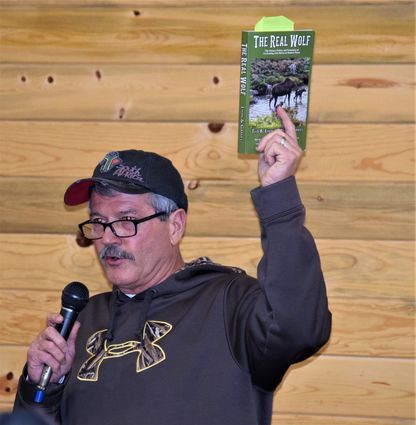Sportsmen share wolf concerns in TC
December 6, 2018

Shana Neesvig
THE REAL WOLF – Sportsman Glenn Schenavar opened the meeting Thursday by introducing The Real Wolf by Ted Lyon and Will Graves as a must read to understand the impacts wolves have on modern times.
There is no argument over whether wolves have survived in Montana. However, there is much discrepancy on where to go from here.
With standing room only, an estimated 250 people filled the Lakeside Resort conference center in Trout Creek last Thursday evening for a meeting over wolf management practices. Local sportsmen called this second meeting, inviting Montana Fish, Wildlife and Parks (FWP), State Rep. Bob Brown, founder of Idaho's Foundation for Wildlife Management's (F4WM) Justin Webb, and area hunting guides and concerned constituents, in an effort to have their wolf management concerns heard.
"The introduction of wolves has changed the traditions and cultures of Montana," meeting organizer and facilitator Glenn Schenavar stated in opening, "passions run deep on both sides" of the wolf debate.
The viewpoint of the majority in attendance was apparent when Schenavar introduced FWP's biologist Neil Anderson. The handful of low-roaring "Boos" was quickly addressed with a, "No," from Schenavar. "We need to work together. We need to stay focused and professional and then we can accomplish a lot," he continued.
This message was revisited multiple times throughout the evening as emotions ran high over who was going to do what to control the increase in wolf numbers.
In 1980, the Northern Rocky Mountain Wolf Recovery Team had formed and in 1987 developed a strategy that Montana, Idaho and Wyoming would collectively implement a wolf recovery program in the Northern Rockies, Central Idaho and Greater Yellowstone areas to mend wolf abolition, explained Diane Boyd, FWP Wolf Management Specialist. With this agreement in place, FWP is mandated to maintain no fewer than 150 wolves in the state. FWP opposition argues that now there are 850 wolves in the state and those in the area are wreaking havoc on ungulate populations in local hunting districts.
Webb took front and center, expressing that he is not a conservationist, but rather a preservationist. A preservationist interested in supporting elk, moose and deer populations for future generations. "Our mission is to promote ungulate recovery in areas impacted by wolf introduction," he stated.
One thing Webb has going for him, making his wolf management mission more attainable, is that Idaho has more relaxed regulations on trapping in comparison to Montana. According to Webb, trapping, though expensive (he claims to have spent $1,600 in fuel alone for each of the 16 wolves he trapped last year) is the most successful method to rid an area of wolves. It was discussed that Montana's trapping regulations are a main reason an organization such as F4WM has not been developed in the state but has been able to flourish in Idaho.
"There are reasons why we have trapping season set up like we do," Anderson said, responding to audience demands on loosening trapping regulations. He stated that snares catch things that you don't want to catch and there are issues with wolf traps as well. In addition, both present safety problems when a limited open season is not in place due to potential grizzly bear encounters. "There are other people and things to think about," he said, referring to a 90-pound woman who may need to get her dog out of wolf trap by herself.
Members of the audience continued to push for more relaxed trapping regulations (extending the season and changing set-backs), so wolf numbers could be managed, and ungulate populations could "recover" to what they were years ago. One sportsman commented, "Give us relaxed regulations and they will get caught." Others suggested that a bounty or payment be made for each wolf eradicated to cover expenses associated with wolf trapping and hunting, similar to what F4WM does.
Bruce Sterling, FWP biologist, commented that elk numbers have not declined in the last 35 years, when he started inventory practices. He stated that the population has been "very stable." He added that this country is not desirable elk habitat and the winter range here is not what elk really want, so there is that to contend with when considering population dynamics.
Audience members called Sterling a "liar" and stated that there are no elk out in the mountains and that years ago there were elk a plenty. Sportsmen commented that all the elk have moved to private lands because the wolves are in the mountains, pressuring them to valley lands. Comments, out of frustration, were made that every single drainage in the area has wolves and one gentleman enthusiastically stated that he has personally witnessed wolf tracks in every single drainage of hunting districts 121 and 122.
After another reminder from Webb that more progress will be made by being professional and respectful to FWP biologists, who he added are trained in this type of work, Anderson commented that there are many variables that need to be considered when determining causes of elk population movements. "We try to look at all the variables to determine what is occurring with population trends."
"The hunting pressures have increased on public grounds versus years ago," Anderson said, being one of many variables that can affect elk. He stated there has been a significant increase in archery hunters in the last 15 to 20 years, which is an increase in hunting pressure, moving elk around.
"Do you think we have a wolf problem?" Jerry Deal, Thompson Falls resident, asked FWP.
Anderson responded, "It depends on where you are at." He reminded the audience that they have common thoughts, so they will generate the same answers. "For every person here, there is another who disagrees."
As the meeting continued into its second hour, it became apparent that the two sides have much to discuss before reaching an agreeable management plan even though both are willing to come to the table and discuss the topic (though some audience members said their words, riddled with anger and frustration, and promptly exited the meeting).
Rep. Brown commented that FWP has always treated him respectfully and he is ready to hear ideas from the sportsmen and get the "ball rolling forward" legislatively.
The sportsmen are eager to get a wolf management organization such as F4WM operating in Montana. They feel it is necessary in order to save ungulate populations before it is too late. Webb was asked multiple times how they can accomplish this. Although the concept is complex, his answer was simple. Everyone needs to come together and voice their opinions in a professional manner.
"Let your voice be heard, but be respectful," Webb continued. "Shouting, pointing fingers and bashing them (FWP) will not work."
Anderson told the audience, "We've always had an open-door policy" and encourage productive dialog. The sportsmen are knocking on this door. They are hoping to work with legislators to change laws and to communicate with FWP in hopes of finding solutions to their concerns.
The next meeting the sportsmen will hold is Feb. 2, 2019, in the Flathead Valley. The location is yet to be determined.







Reader Comments(0)